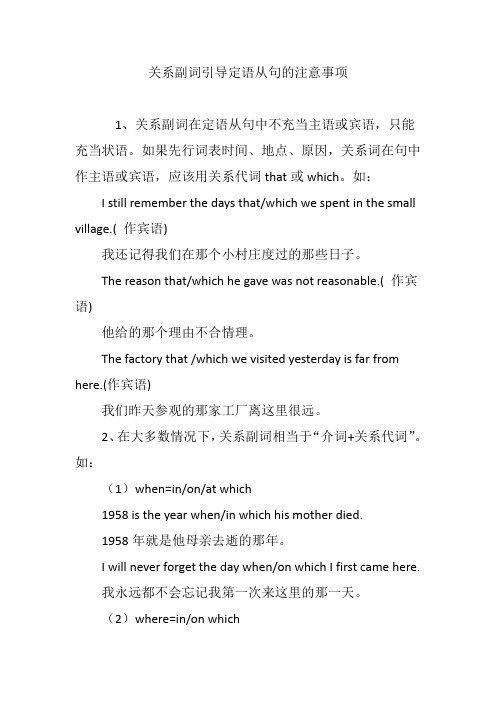关系副词在定语从句中的用法
- 格式:ppt
- 大小:215.01 KB
- 文档页数:3


关系副词引导定语从句关系副词引导定语从句导语:关系副词可代替的先行词是时间、地点或理由的名词,在从句中作状语。
下面我们来看看关系副词引导的定语从句,供您参考和借鉴。
【关系副词引导的定语从句】1)when, where, why关系副词when, where, why的含义相当于 "介词+ which"结构,因此常常和"介词+ which"结构交替使用,例如:There are occasions when (on which) one must yield. 任何人都有不得不屈服的时候。
Beijing is the place where (in which) I was born. 北京是我的出生地。
Is this the reason why (for which) he refused our offer 这就是他拒绝我们帮助他的理由吗2)that代替关系副词that可以用于表示时间、地点、方式、理由的名词后取代when, where, why和 "介词+ which"引导的定语从句,在口语中that常被省略,例如:His father died the year (that / when / in which) he was born. 他父亲在他出生那年逝世了。
He is unlikely to find the place (that / where / in which) he lived forty years ago. 他不大可能找到他四十年前居住过的地方。
【关系副词VS关系代词】先来看一看关系副词和我们熟知的关系代词有关联。
以where为例,首先问大家一个问题,where是什么意思呢?“哪儿!”你肯定会毫不犹豫的给出这个答案,然后躲到电脑后,偷笑栗子问的问题太弱。
其实不然。
我们换个问题“Where are you?”翻译成中文是“你哪儿?”还是“你在哪儿?”我想这次应该大家会毫不犹豫的.选后者吧!没错,where确切翻译应该是“在哪儿”,所以见到“Where did Tom live?”时,我们的答案是“T om lived in Beijing.”而非“Tom lived Beijing.”接下来回到正题,我们通过以下的等式替换来看看关系副词和关系代词的关系吧。

定语从句的关系副词定语从句是英语中常见的一种句子结构,用于对名词或代词进行修饰或限定。
在定语从句中,关系副词担任重要角色,起到连接主句和从句的作用。
本文将详细介绍定语从句的关系副词以及其在句子中的使用。
一、关系副词的定义和分类关系副词,又称为关系副词连词,是连接主句和从句的词语。
关系副词有三个,分别是where、when和why。
它们分别表示地点、时间和原因的关系。
1. where:表示地点的关系。
常用于修饰表示地点的名词或代词。
例句1:This is the house where I was born.(这是我出生的房子。
)例句2:I will never forget the moment where I met you.(我永远不会忘记遇见你的那一刻。
)2. when:表示时间的关系。
常用于修饰表示时间的名词或代词。
例句1:I will always remember the day when we first met.(我会永远记得我们初次见面的那一天。
)例句2:I love the season when flowers bloom.(我喜欢花开的季节。
)3. why:表示原因的关系。
常用于修饰表示原因的名词或代词。
例句1:I don't understand the reason why he left.(我不明白他离开的原因。
)例句2:That's the only explanation why he acted that way.(这是他那样行动的唯一解释。
)二、关系副词的使用关系副词在定语从句中的使用需要注意以下几点:1. 关系副词引导的定语从句在句子中可以充当主语、宾语或表语。
例句1:This is the place where we will hold the party.(这是我们将举办派对的地方。
)(关系副词where在从句中作地点的修饰成分)例句2:That was the reason why she didn't come to the meeting.(那就是她没有参加会议的原因。

关系副词引导定语从句的注意事项1、关系副词在定语从句中不充当主语或宾语,只能充当状语。
如果先行词表时间、地点、原因,关系词在句中作主语或宾语,应该用关系代词that或which。
如:I still remember the days that/which we spent in the small village.( 作宾语)我还记得我们在那个小村庄度过的那些日子。
The reason that/which he gave was not reasonable.( 作宾语)他给的那个理由不合情理。
The factory that /which we visited yesterday is far from here.(作宾语)我们昨天参观的那家工厂离这里很远。
2、在大多数情况下,关系副词相当于“介词+关系代词”。
如:(1)when=in/on/at which1958 is the year when/in which his mother died.1958年就是他母亲去逝的那年。
I will never forget the day when/on which I first came here.我永远都不会忘记我第一次来这里的那一天。
(2)where=in/on whichThe house where /in which he lives is very big.他住的那栋房子很大。
(3)why=for whichThis is the reason why/for which he was late.这就是他迟到的理由。
3、当crossing, situation, business, point等作先行词表抽象地点,其后常用where引导的定语从句。
如:I work in a business where almost everyone is waiting for the great chance.我在一家几乎人人都在等待发展机遇的大公司工作。

定语从句关系副词例句定语从句,一个简单句跟在一名词或代词后(先行词)进行修饰限定,所以叫做定语从句。
接下来要给大家推荐的是定语从句关系副词例句,欢迎阅读以及参考!定语从句关系副词例句篇1一、基本概念:在复合句中,修饰某一名词或代词的从句叫定语从句。
如:Do you know the man who spoke at the meeting just now?That is the house where he lived ten years ago.定语从句所修饰的词叫先行词;定语从句一般用关系代词或关系副词来引导,关系词放在先行词与定语从句之间起连接作用,同时又作从句中的一个成分。
引导定语从句的关系代词有:that, who, whom, whose, which;关系副词有:when, where, why.二、关系词的用法:(一)关系代词的用法:1. 作主语用who, which和that, 如:He is the man who/that lives next door.The train which/that has just left is for Shenzhen.2. 作宾语用whom, who, which, that, 如:The man (whom/who/that) we have just seen is a famous writer.Where is the book (which/that) I bought last week?注:在非正式文体中,用于指人的关系代词who whom, that 通常可以省略,但在正式文体中通常用whom, 不可省略;用于指物的关系代词which和that 在非正式文体中也通常省略,但在正式文体中一般不省略。
3. 作定语用whose, 如:(a) He is the man whose car was stolen last week.(b) It was a meeting whose importance I did not realize at that time.注:“whose +名词中心词”这一结构在定语从句中既能作主语(如上a句),又能作宾语(如上b句)。

定语从句的关系副词定语从句是指修饰名词或代词的从句,描述并限定其所修饰的名词或代词的性质、特征、状态等。
而关系副词在定语从句中起到连接作用,引导定语从句的引导词。
一、关系副词及其用法关系副词常见的有:when、where和why,它们分别表示时间、地点和原因。
在定语从句中,关系副词作为关系词引导从句,起到连接主句和从句的作用。
1. when当我们在定语从句中修饰表示时间的名词时,可以用关系副词when引导。
示例1:I still remember the day when we first met.译文:我仍然记得我们第一次见面的那天。
示例2:Do you remember the moment when you realized you were in love?译文:你还记得你意识到自己爱上了的那一刻吗?2. where当我们在定语从句中修饰表示地点的名词时,可以用关系副词where引导。
示例1:This is the house where I grew up.译文:这是我长大的房子。
示例2:She took me to the park where we used to play.译文:她带我去了我们过去常常玩的那个公园。
3. why当我们在定语从句中修饰表示原因的名词时,可以用关系副词why引导。
示例1:That is the reason why I couldn’t attend the meeting.译文:那就是我不能参加会议的原因。
示例2:Can you explain the reason why you made that decision?译文:你能解释一下你作出那个决定的原因吗?二、关系副词的注意事项1. 注意关系词的位置关系副词在定语从句中作为关系代词引导从句时,要放在名词之后。
示例1:I could never forget the day (when) we won the championship.译文:我永远不会忘记我们赢得冠军的那一天。
关系副词引导的定语从句1.关系副词when, where, why在定语从句中分别表示时间、地点或原因。
关系副词when 在从句中充当时间状语,where 充当地点状语,why 充当原因状语。
当先行词在定语从句中作状语时,引导词要用关系副词。
I will never forget the day when I met Mr. Lin.This is the place where we lived for 5 years.I know the reason why he came late.2.关系副词常可换成“介词+关系代词”。
When 可换成on/in/by which 等,where可换成at/in/from which 等,why 换成for which。
但如先行词前已有介词,则关系副词不可换成“介词+关系代词”。
I still remember the day when (on which ) we first met.比较:This is the factory where I paid a visit the other day.This is the factory to which I paid a visit the other day.This is the factory that/which I visited the other day.若定语从句的先行词是地点,但定语从句缺主语或宾语,用which或that引导定语从句,而不用where来引导。
I’ve come to the point where I can’t stand him.3.that 有时可以代替关系副词引导定语从句,此时that可以省去,是非正式用法。
It happened on the day (that/which) I was born.4.way 后面的定语从句不能用how引导,如way在从句中作状语,应用in which或that引导,甚至还可省略引导词;如作主语或宾语,应用that或which 引导。
方法一:用关系代词,还是关系副词完全取决于从句中的谓语动词。
及物动词后面无宾语,就必须要求用关系代词;而不及物动词则要求用关系副词。
后面必须跟宾语意义才完整的实义动词,叫做及物动词(transitive verb)。
如I believe that the committee will consider our suggestion.我相信委员会将会考虑我们的建议。
“How long can I keep the book ?”Harry asked.哈里问:“这本书我可以借多久?”Dr. Bethune set us a good example. 白求恩大夫给我们树立了好榜样。
Crude oil contains many useful substances.原油含有许多有用的物质。
本身意义完整后面不须跟宾语的实义动词,叫做不及物动词(intransitive verb)。
如:Birds fly.鸟会飞。
It happened in June 1932.这件事发生于一九三;年六月。
My watch stopped.我的表停了。
例如:This is the mountain /village where I stayed last year.I'll never forget the days when I worked with you.判断改错(注:先显示题,再显示答案,横线;用不同的颜色表示出。
)(错)This is the mountain /village where I visited last year.(错)I will never forget the days when I spent in the countryside.(对)This is the mountain village(which) I visited last year.(对)I'll never forget the days (which) I spent in the countryside.习惯上总把表地点或时间的名词与关系副词where,when联系在一起。